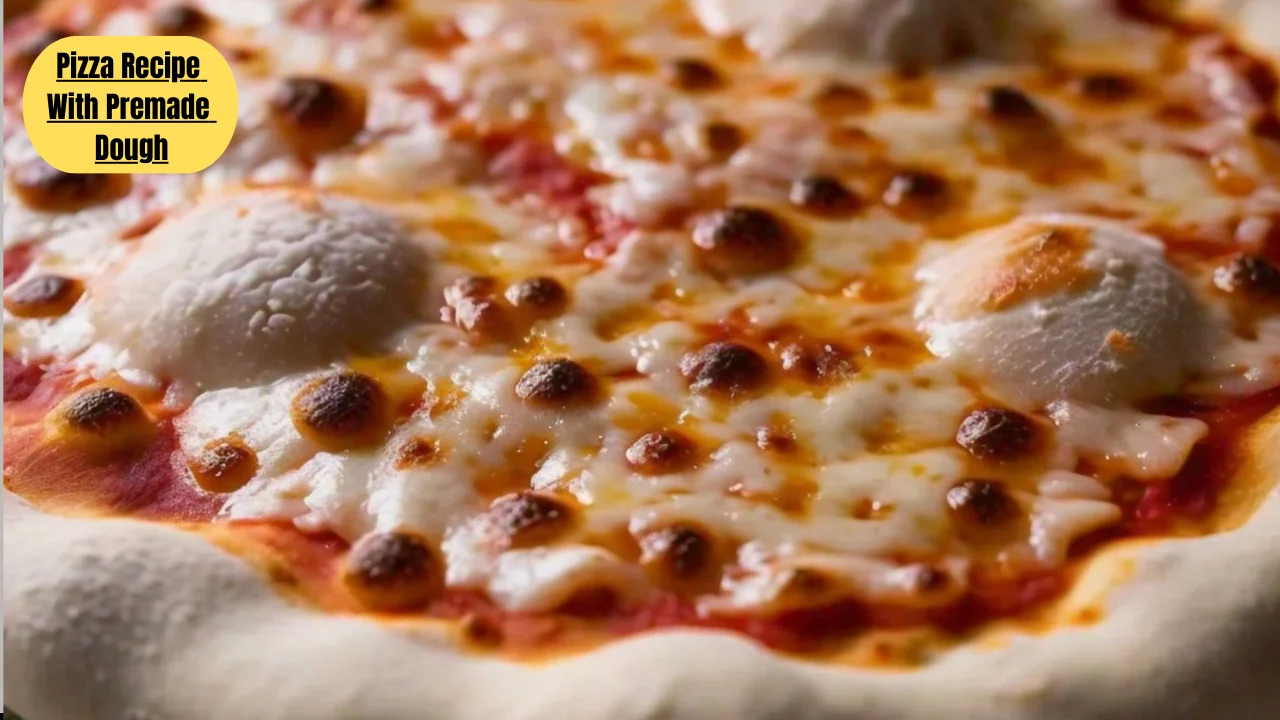Before delve into Pizza Recipe With Premade Dough , first explore history and types of pizza
History of Pizza.
- Ancient Beginnings: The origins of pizza can be traced back to ancient civilizations, including the Egyptians, Greeks, and Romans, who all made flatbreads with various toppings. The modern version of pizza, as we know and love it today, originated in Naples, Italy, in the late 18th century, where it evolved from a simple flatbread into a delicious and iconic dish.
- Neapolitan Pizza: Naples, Italy is widely credited with inventing the world’s first true pizza, a culinary masterpiece that has since become a beloved dish globally. The classic Margherita pizza, named after Queen Margherita of Savoy, was created in 1889 by pizzaiolo Raffaele Esposito. The classic Neapolitan pizza, also known as the “Pizza Margherita,” was created in 1889 to honor Queen Margherita of Savoy’s visit to Naples, Italy. The pizza’s colors were intentionally chosen to resemble the Italian flag.
- – Tomatoes represent the red color
- – Mozzarella cheese symbolizes the white color
- – Fresh basil leaves represent the green color
- This iconic pizza combination has since become a beloved favorite around the world, and its origins are a testament to the creativity and patriotism of Neapolitan cuisine.
- Global Spread: Pizza gained popularity outside Italy after World War II, when returning soldiers brought their love for pizza back home. The United States became a significant hub for pizza innovation, leading to various regional styles like New York-style, Chicago deep-dish, and California gourmet pizzas.
Types of Pizza.
- Neapolitan Pizza: Characterized by a thin, soft crust, fresh tomatoes, mozzarella, and basil.
- New York-Style Pizza: Characterized by its signature large, foldable slices and crispy, thin crust, this style of pizza has become a classic favorite among pizza enthusiasts.
- Chicago Deep-Dish Pizza: Features a thick crust and layers of cheese, toppings, and chunky tomato sauce.
- Sicilian Pizza: Rectangular with a thick, focaccia-like crust and robust tomato sauce.
- California Pizza: Unconventional toppings like BBQ chicken or smoked salmon are hallmarks of this pizza style.
Benefits Of Making Pizza with Premade Dough.
- Time-Saving: Premade dough eliminates the need to mix, knead, and let the dough rise, significantly cutting down on preparation time.
- Consistency: Premade dough provides consistent results, ensuring a reliable texture and flavor every time you make pizza.
- Convenience: It’s readily available at most grocery stores, making it a convenient option for a quick and easy meal.
- Ease of Use: Premade dough is user-friendly, even for those who are new to making pizza. It’s pre-measured and prepped, simplifying the cooking process.
- Reduced Mess: Using premade dough minimizes the mess associated with making dough from scratch, including fewer dishes to clean.
- Cost-Effective: It can be more economical than purchasing all the ingredients to make dough from scratch, especially if you’re making pizza infrequently.
- Customizable: You can still personalize your pizza with your favorite sauces, cheeses, and toppings, while benefiting from the ease of the premade dough.
- Consistent Quality: Premade dough often has a standardized quality, ensuring that your pizza crust turns out well every time.
- Versatility: Premade dough can be used for various types of pizza, including traditional, stuffed crust, or even dessert pizzas, allowing for diverse meal options.
- Less Preparation Stress: It reduces the stress and complexity involved in preparing pizza dough, making it easier to enjoy the process of creating and eating pizza.
Here’s a simple recipe.

Ingredients
Instructions.
- Preheat your oven to 475°F (245°C). Warm up your pizza stone in the oven for a crispy crust. This helps absorb moisture, cook evenly, and adds smoky flavor. Heat up for 30 minutes to an hour before baking! This will ensure the stone is scorching hot and ready to cook your pizza to a crispy, well-done crust.
- Take the premade dough out of the refrigerator and let it sit at room temperature for about 20 minutes.
- Lightly flour your work surface and roll out the dough to your desired thickness. If the dough is too elastic and springs back, let it rest for a few more minutes before rolling again.Transfer the rolled-out dough to a pizza peel or a baking sheet lined with parchment paper. If using a pizza stone, sprinkle some cornmeal on the peel to prevent sticking.Spread the pizza sauce evenly over the dough, leaving a small border around the edges for the crust.Sprinkle the shredded mozzarella cheese evenly over the sauce.Add your desired toppings evenly over the cheese.Sprinkle dried oregano and dried basil over the top.Drizzle a little olive oil over the pizza for added flavor and crispiness.If using a pizza stone, carefully slide the pizza onto the preheated stone. Warm up your baking sheet in the oven if using.Bake for 10-15 minutes, or until the crust is golden brown and the cheese is bubbly and slightly browned.Remove the pizza from the oven and let it cool for a couple of minutes.If desired, sprinkle grated Parmesan cheese, red pepper flakes, and fresh basil leaves on top.
- Slice and serve hot.
FAQs.
Q: How do I make my pizza crust crispy?
A: Warm up oven, use a pizza stone, and roll dough thin for a perfect pizza. Also, brush the edges with olive oil before baking.
Q: Can I freeze premade pizza dough?
A: Yes, you can freeze premade pizza dough. Just make sure it’s well-wrapped in plastic wrap and stored in a freezer bag. Thaw it in the refrigerator all night before using.
Q: How long should I let the premade dough rest before using it?
A: Let the premade dough rest at room temperature for about 20-30 minutes. This makes the dough relaxed and easy to roll out, allowing you to work with it effortlessly.
Q: What are some healthy topping options for pizza?
A: Fresh vegetables (bell peppers, onions, spinach, mushrooms), lean proteins (chicken, turkey), and lower-fat cheese options are great healthy toppings.
Q: Can I use other types of cheese besides mozzarella?
A: Absolutely! Try using a blend of cheeses like cheddar, provolone, or Parmesan for different flavors and textures.
Q: How do I prevent my pizza from being soggy?
A: Ensure your oven is hot enough, don’t overload with toppings, and if using vegetables with high water content (like tomatoes or mushrooms), consider pre-cooking or patting them dry.
Q: Is it necessary to use a pizza stone?
A: While a pizza stone helps achieve a crispier crust by evenly distributing heat, you can still make good pizza using a regular baking sheet.
Q: How do I store leftover pizza?
A: Store leftover pizza in an airtight container in the refrigerator for up to 3-4 days. Reheat in the oven or on a stovetop for the best results.
Enjoy your homemade pizza recipe with premade dough with the satisfaction of knowing its rich history, the benefits of creating it yourself, and having answers to common questions!




